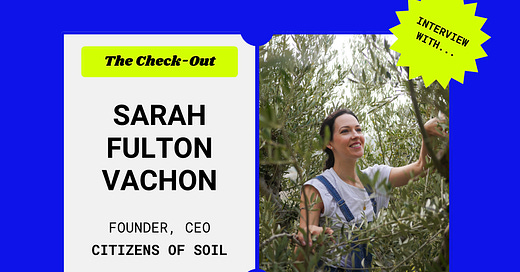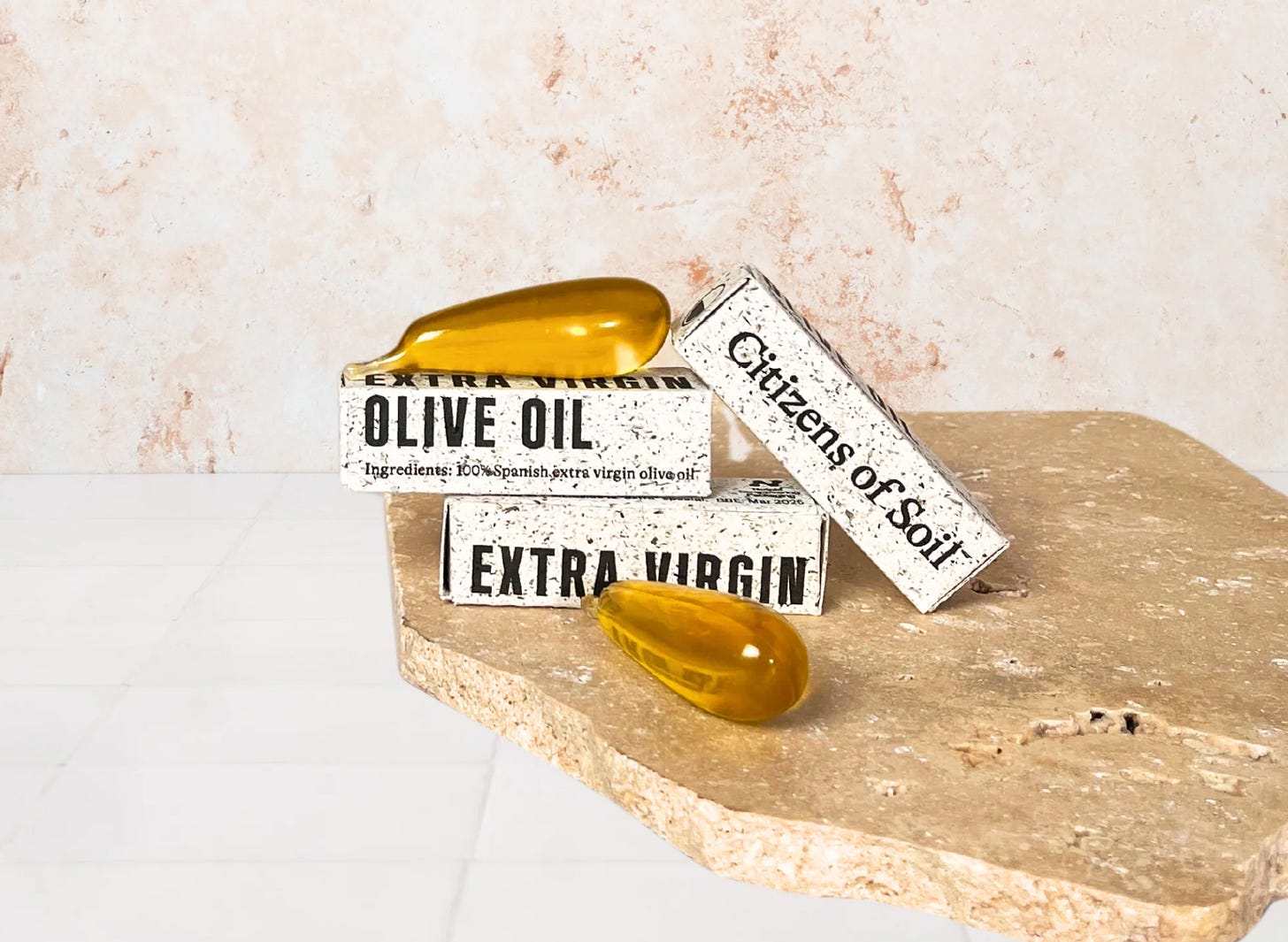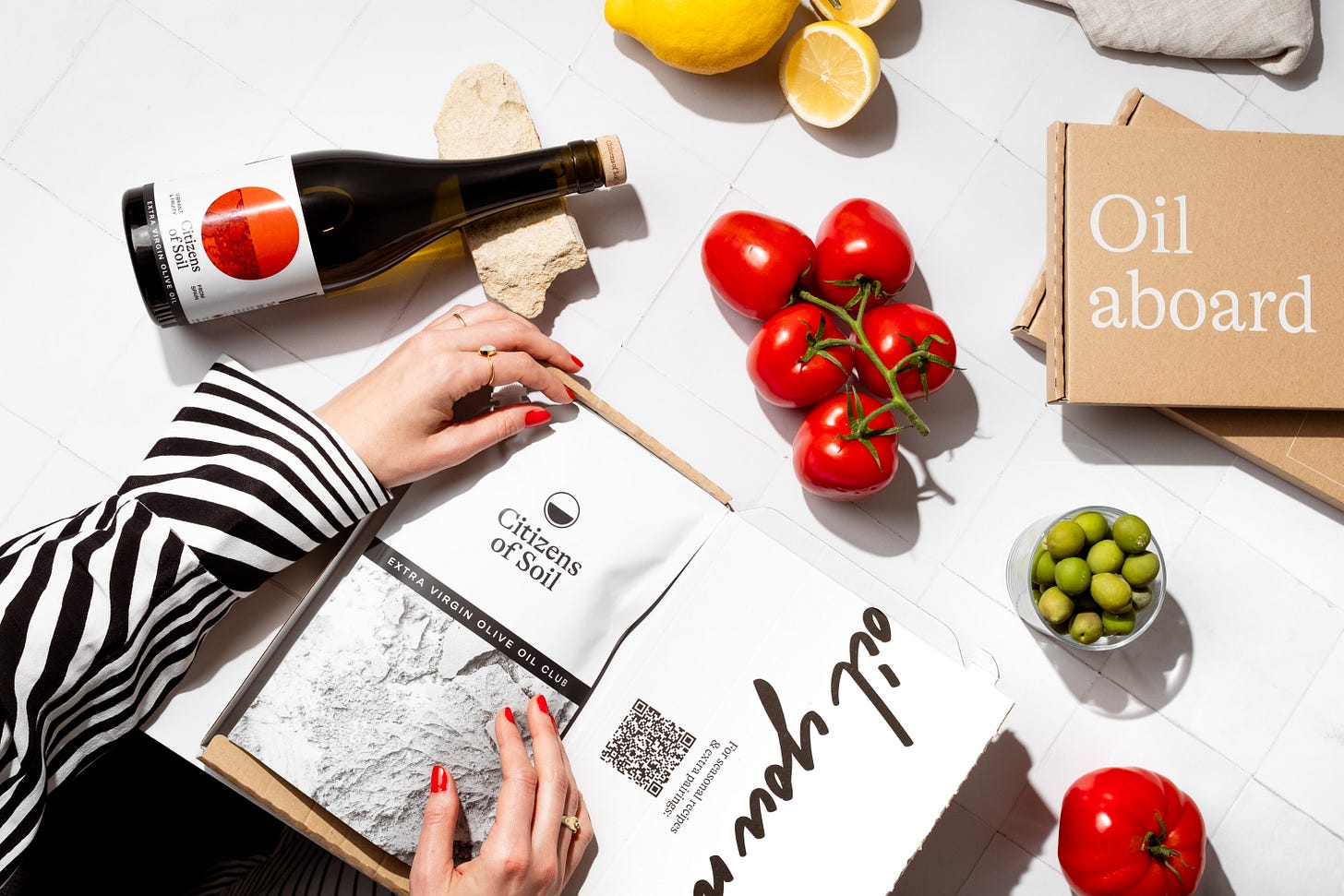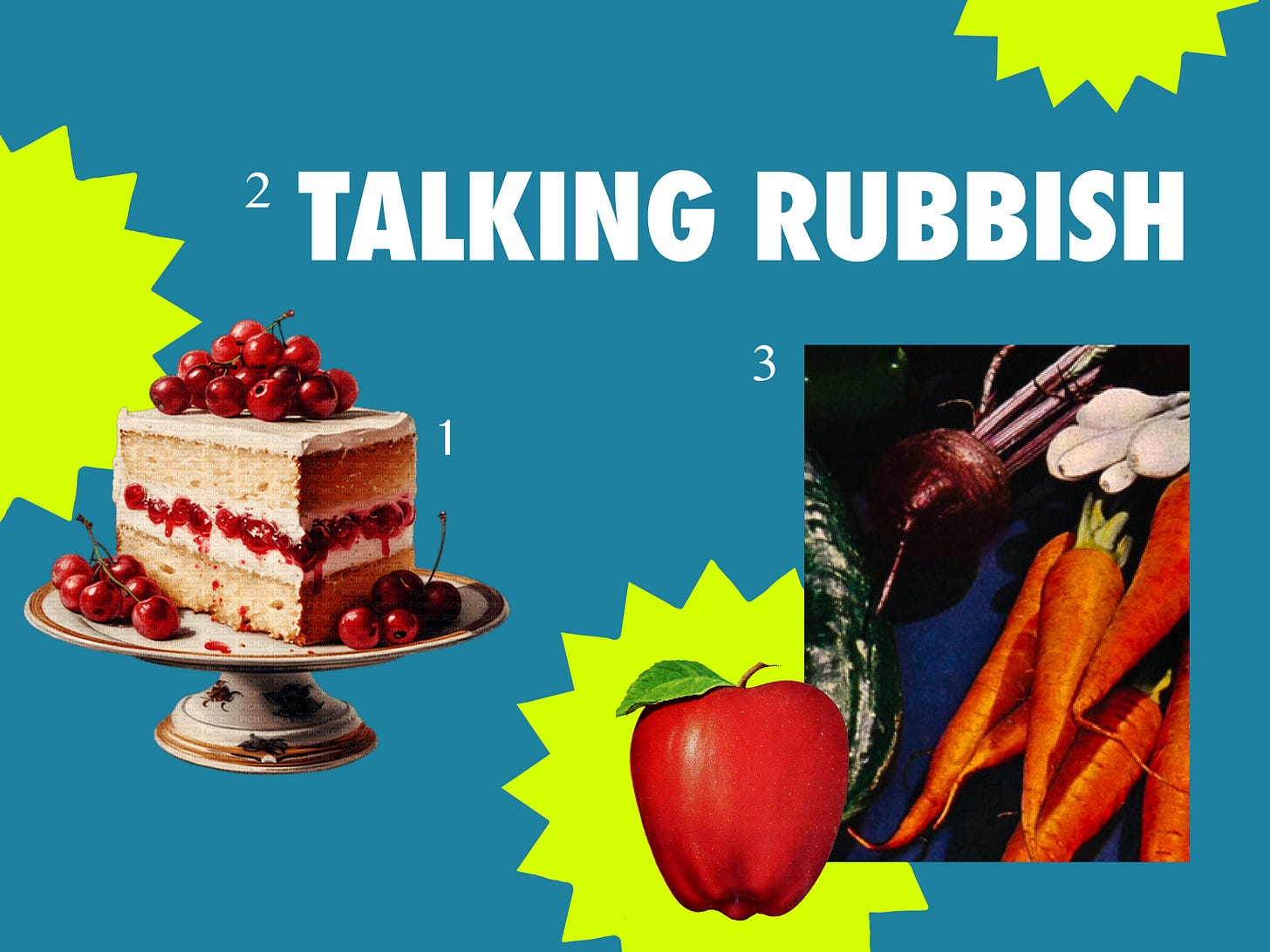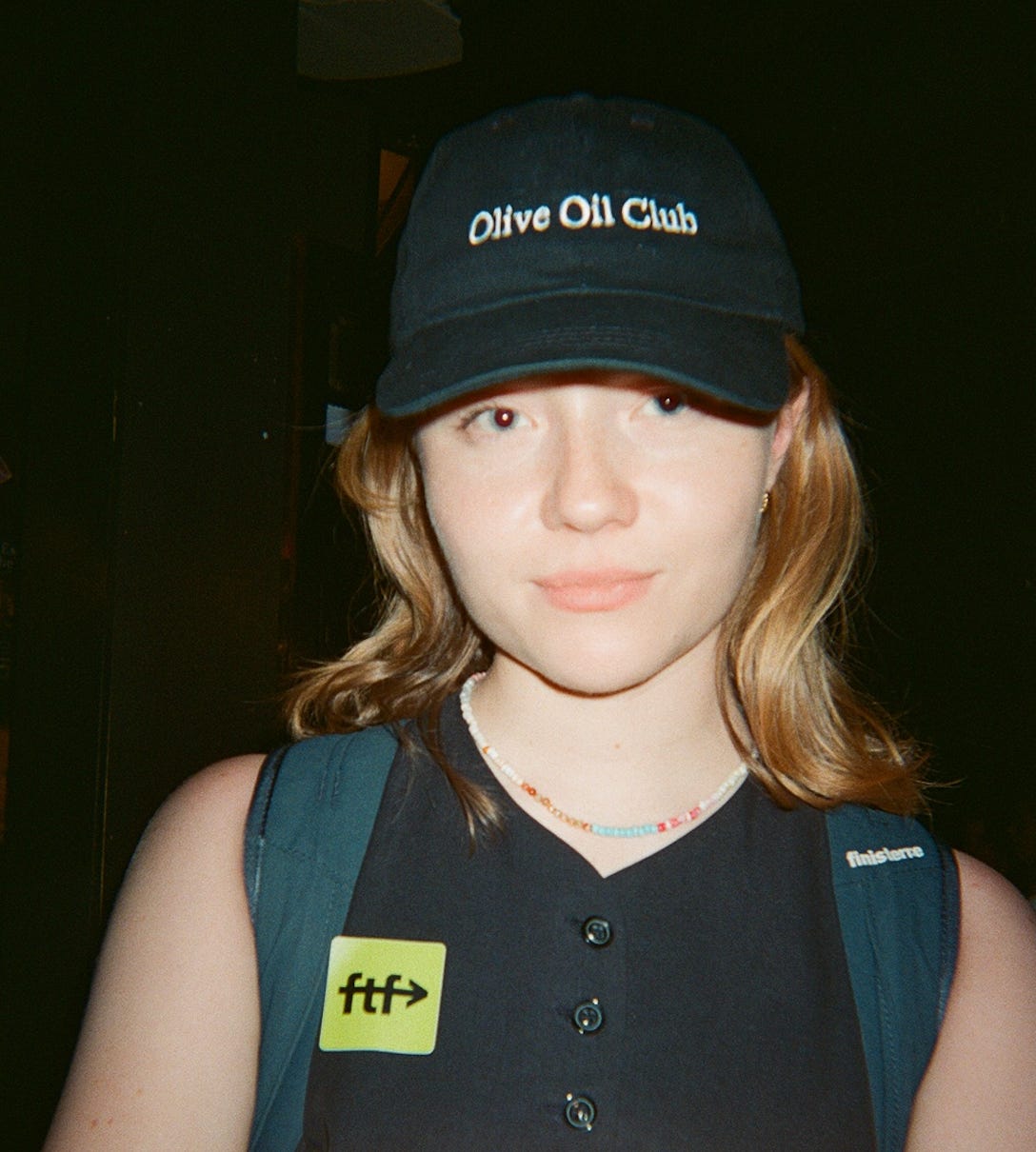🛒 The Check-Out: Sarah Fulton Vachon, Citizens of Soil
+ 5 cool climate events + what's in our basket - CSA boxes, podcasts & Companio Bakery...
Happy Thursday! Welcome to The Check-Out - your weekly dose of climate x consumer goods inspiration, and your discovery box of products and events the Following the Footprints team are loving this week. It’s great to have you here.
If you’ve seen me in the past two months, you’ve likely seen my Olive Oil Club cap too (picture at the end of this email). Generously gifted by one of my favourite brands, Citizens of Soil, I’m convinced good headgear is the perfect conversation starter (a short-lived stint with a watermelon skateboard helmet really tested this). This cap has been no exception - I’ve spoken to strangers everywhere from Copenhagen Airport to a surf school in New York about what the Olive Oil Club is. This week we’ve invited Sarah, Founder & CEO, to answer 6 of our burning questions and tell us more about their newly announced partnership with NOTPLA.
After we chat to Sarah, we’ll share what the Following the Footprints team has loved and consumed this week and 5 Climate x Consumer Goods events coming up. Let’s dig in…
> Brand Spotlight
🎙️ Behind the Brand: 6 questions with Sarah Fulton Vachon, Founder & CEO of Citizens of Soil
👉 Hello! We’d love the non-LinkedIn lowdown on who you are, what Citizens of Soil is focused on, and what you were doing before you were making the planet cooler (both meanings intended)?
I’m a career marketeer, but I’ve always had a connection to food & drink as well as sustainability. When I started Citizens of Soil, I was working for Provenance.org, who pioneered blockchain technology for supply chains and continues to use technology and data to prevent greenwashing.
At Provenance, we had incredible projects diving deep into all sorts of supply chains, many of which were commodities such as coffee, chocolate, and cotton. Being surrounded by absolutely brilliant consultants and working with experts on sustainability frameworks really led to why we built Citizens of Soil on a foundation of positive impact.
👉 You operate a used pouch return scheme, something that we have seen many brands attempt but few succeed with. Talk us through how you’ve designed a process that works for your company and product?
Since we knew we were going to pay our farmers more than double the commodity rates when we started, we had to make the end product feel premium. But having beautiful bottles with expensive finishes and special, perfect-pour corks meant we couldn’t just have them thrown out each time.
Coming from that sustainability space, I saw more and more beauty and household brands jump into the refill revolution, so it was something we wanted from day one. Especially because we also knew we wanted to build a subscription, the pouches were 15x less carbon than our glass bottles—and that’s not even including the fact that they take no additional packaging to secure them in transport.
But that doesn’t matter all that much if you don’t engage your customers around the refill return scheme. So we splash this copy up on the pouches and boxes, and try at every point to remind people they can send them back to us.
Currently, we process these with TerraCycle to ensure we can close the loop and so that all of the plastic gets turned into something new.
It’s absolutely not a perfect solution. We’ve tried cleaning sites to properly create a zero-waste option, different packaging and materials, and also different ways to get our Citizens to send them back.
After talking to loads of experts in zero-waste and circular solutions, we feel confident we’ve got the best option in the UK for extra virgin olive oil—but we’re working to still progress it.
👉 You recently announced a partnership with NOTPLA - tell us more!
We are launching a plastic-free, seaweed-based packaging for single-serve extra virgin olive oil pipettes. We’re doing this in partnership with Notpla, the 2022 Earthshot Prize-winner. These are 100% natural, biodegradable, home-compostable, and vegan. They’re even edible!
As a business, we’ve really not done a lot of sampling (which, as a food business, is crucial), but it’s been down to not having a sustainable packaging solution. Tiny glass bottles or even our tiny versions of our pouches— of which we’ve tried both—end up in the bin, burst, or often both.
Along with an increasing interest in extra virgin olive oil shots and people wanting an on-the-go version for their lunches and take-aways, using a completely zero-waste option means that when we put thousands of these out in the market in a month—we feel confident that they have the lowest impact possible and help us continue to test and innovate on more plastic-free options for the future.
👉 What have you learned about regenerative agricultural practices from working with your suppliers? Anything that might surprise brands looking to do the same?
When we talk about regenerative farming, we see the first step in that journey as being organic. Or as I hear it called, “no-chem regen.” Seeing as we’re all about soil health, synthetic-free farming practices is crucial. But it’s something to ask your farmers and establish early on, since the regenerative space is a bit like the wild west right now, and until more regulation comes in like we’ve seen in the organic movement - not all farmers follow the same rules.
On the positive side, we were recently having a meeting with several of our farmers from across the Mediterranean around the topic of combatting the olive fly (the main insect that destroys our yields and quality). And it was really fantastic to hear them not only share some of the ways they’re working to combat the fly - but moreover hear how building in biodiversity is the only consistent way to really prevent the many issues from pests in an organic farm.
It might sound backwards to add in a lot more wildlife, bugs, and plants in order to keep pests under control, but this balance and harmony with nature is exactly what regenerative is about.
👉 Ok, magic wand time; if we could grant you three wishes for the Olive Oil industry, what would they be?
Fairer, higher prices to farmers across the board.
Governments to better support small-scale producers and their transition to regenerative environmental practices.
That the “oil” industry would get out of its own way and stop clouding the difference in refined oils and extra virgin. Extra virgin olive oil is a fresh fruit juice that’s nutrient-rich and full of antioxidants when done right. It takes a lot to make this and the price should be reflected in that. Refined oils are highly-processed and shouldn’t even be in the same category; their low price puts pressure on true EVOO producers to keep their prices down—but this is like saying fresh orange juice and orange soda are the same thing.
👉 Finally - We’d love some recommendations; one climate-related resource, one person to follow online and one consumer brand that’s killing it!
Kiss the Ground - One of the larger, “easy to digest” resources if you’re looking to get your team and people new to the topic of regenerative farming into a better understanding.
The FarmED Podcast - Very UK-focussed, but a nice one to hear from farmers about changing the food system and building regenerative systems.
Wild Deodorant - I think this brand has done such a fantastic job to get everyone on board with natural deodorants and refills, without even making it purely a “sustainability” swap. They’re just cool, easy, and have created such a nice customer experience. And as a result, they’ve created loads more impact than if they just went after the eco-warriors.
A huge thanks to Sarah for jumping into the hot seat today!
> In Our Basket
🔎 What we loved and consumed this week:
From Rosalin in Manchester: I went to Companio Bakery in Manchester this weekend, which promotes artisan food production, and had the best mystery cake ever (still not sure what was in it). Their pantry also felt very FTF themed, stocked with two of our team’s brands (Belazu, Wildfarmed) and a lot of our favorites!
From Laura in Manchester: One of our amazing readers has a podcast called ‘Talking Rubbish,’ where James Piper and Robbie Staniforth talk in just the kind of nerdy detail we LOVE at FTF about recycling infrastructure and packaging formats. This week I got filled in on refill and what is needed to get those schemes up and running.
From Lexi in San Diego: Last week I had my first CSA (community-supported agriculture) fruit and veg box delivered. I got to hand-select what, and how much, I wanted. So far, it’s been super convenient, fun to try new things (I got kiwi grapes this week), and encouraged me to consume more fruits and vegetables.
> Monthly Events Roundup!
📆 5 Consumer Goods x Climate Events:
Browse 20+ upcoming consumer x climate events, and submit yours.
14th-17th October - Sustainable Brands San Diego
Organisers: Sustainable Brands
Location: (you guessed it) San Diego, USA
15th October - CHEERS! The Drinks Summit by Bread & Jam
Organisers: Bread & Jam
Location: Business Design Centre, London, UK
16th-18th October - Blue Earth Summit
Organisers: Blue Earth
Location: The Fireworks Factory, London, UK
16th October - Blue Earth Summit x People, Planet, Pint: Sustainability Meetup
Organisers: Small99, Blue Earth
Location: Dial Arch, London, UK
Say hi to Laura Matz if you’re going!!
16th October - Startup CPG Mixer
Organisers: Startup CPG
Location: Tribeca, New York, USA
That’s it for today!
The Olive Oil Club hat, gifted (and snapped) after our FTF x Nudie Jeans event…
And now…
Know a brand we should spotlight next? Let Leone know!
Have links that can make the team learn or laugh? Share them with us, we might just share them in The Check-Out next week.
Hungry for more? You’ll see us on Monday! That’s when we suit up and get serious, digging into a topic that is guaranteed to make you look smart at standup.
Much love,
Team FTF


